They are groundBREAKERS – pioneers and role models who want more out of life than poverty, crime, and resignation. They prove that is possible – both in their community and throughout South Africa.
The karate trainer stands sweating in front of the picture of Jesus that someone has painted on a sheet and hung on the wall, watching as Vuvu calls the kids to gather round. Vuvu is 23 years old, and her full name is Vuyokazi Noyo. But to her friends and the kids who form a circle round the young woman in this church on the hill above the South African township of KwaNobuhle, she is simply Vuvu. She is getting ready to talk to the kids about drug prevention. But Vuvu’s presentation technique bears as much resemblance to a dry educational lecture as this simple room with its wooden walls, corrugated roof and strip lights where karate training has just finished does to the traditional image of a church.
Vuvu claps her hands. She gesticulates, sings with the kids. Her sentences are a mixture of English words and the isiXhosa language with its click consonants. She talks about “Flakka,” the horror drug which can lead to violent aggression and is widespread among South Africa’s poorest in particular. It is an everyday reality in this district where many of the houses are simple brick buildings or huts. Vuvu mimes an addict staggering about, and urges the openmouthed kids to be careful. Then she plays some techno music and everyone dances, even the karate trainer. The children crowd round Vuvu, she says her goodbyes and promises to come back soon.
“Define your life, don’t let it be defined for you. Life always has something better in store for you.”
Ayanda Sali alias Einstein, groundBREAKER
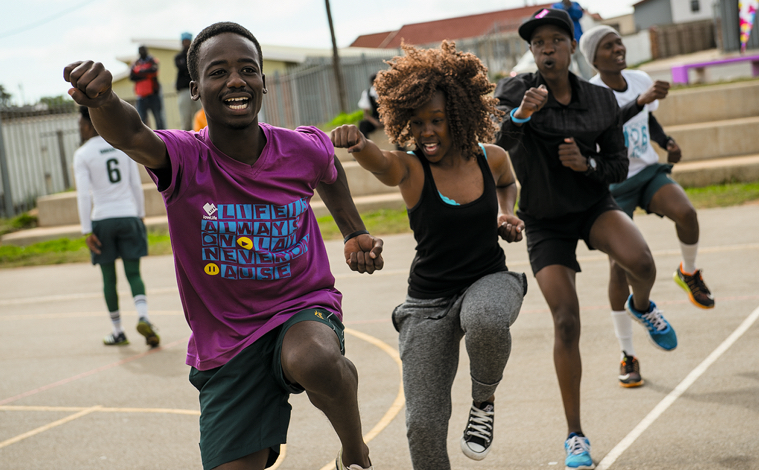
“Has this work changed me?” Vuvu laughs at the question. “You have no idea what I used to be like. I’ve learned so much about myself here. I have never been shy, but I wasn’t able to build up real relationships with people.”
Vuvu has left the church and is now sitting in a bright room at the loveLife Centre in KwaNobuhle. The modern, purpose-built youth center opened in 2012, cost about €2 million, and is located in the heart of the township where 99 percent of the population is black. It belongs to the city of Uitenhage (pronounced “yoo-tin-haig”). The center has seminar rooms, workstations, a snooker room, a radio studio and a health clinic with a counselling service, open WiFi, and a large sports arena in the inner courtyard. Vuvu comes here every day. This is the place that changed her life and where, day after day, she changes the lives of so many other people – sometimes just a little bit, sometimes in a big way.
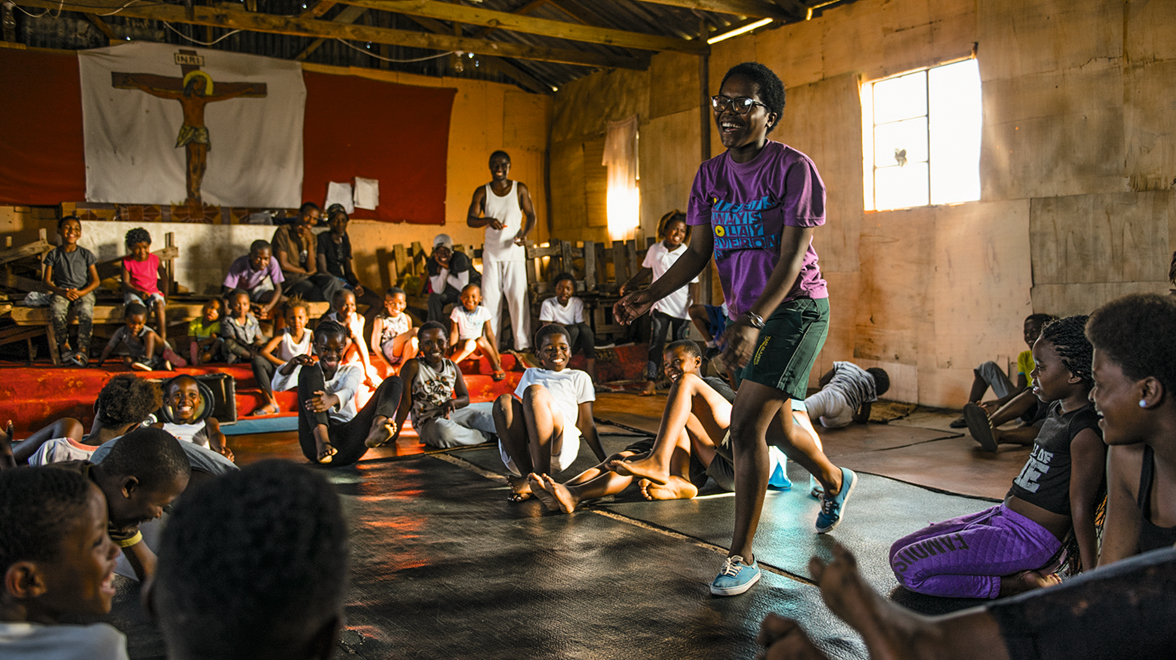
Drug prevention with music: groundBREAKER Vuvu during a presentation in a church in KwaNobuhle.
Vuvu and her two friends nicknamed Bubbles and Oshi are groundBREAKERS. They are pioneers. Young people who are building a future for themselves in surroundings where the prospects for many are not bright. And they are showing others how to build their futures, too.
Young people apply to join the program, and if they are accepted they are awarded a one-year scholarship. They work in the center financed by the Volkswagen Community Trust. The groundBREAKERS talk to the children and adolescents about contraception and health, about vocational training and family planning, they give courses and organize sports sessions. “loveLife is fun, entertainment, education, everything”, Vuvu explains. Oshi and Bubbles nod in agreement. For them, this is the ideal preparation for their working lives and brings the chance of a good education.
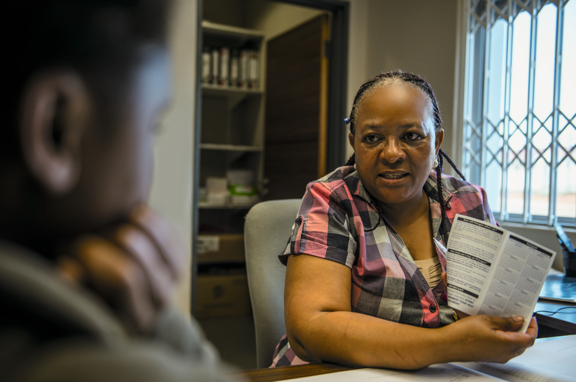
Everyone at the loveLife Centre calls Thobeka Mzuzu Szyre (left) “Sista T.” She talks to kids and adolescents about sexual education and health, and prescribes contraceptives.
The Volkswagen logo on the outside of the building and on the partition walls inside indicates how closely the Group engages with the center and its work. This is not marketing, this is a deep commitment. The Volkswagen plant is the largest private-sector employer in Eastern Cape. The province on the Indian Ocean coast has a twinning partnership with the German State of Lower Saxony, the home of Volkswagen. Some 1.2 million people live in Nelson Mandela Bay Metropolitan Municipality, which not only includes Uitenhage, but also the nearby coastal hub of Port Elizabeth. Like the rest of South Africa, unemployment, corruption, and, more recently, a renewed increase in HIV infection rates, are part of everyday life. Many have a distrust of politics, and there is great frustration. A great deal of progress has been made since apartheid ended in 1994, but much still remains to be done. That is why the work at the loveLife Centre is so important, not just for the district and the city, but much further afield as well. There are loveLife Centres all over the country, but according to Nonkqubela Maliza, Director of Corporate & Government Affairs at Volkswagen South Africa, this one is something special.
“It’s this center’s leadership that makes it so exceptional,” Ms. Maliza says on a visit to the center. “The change theory behind loveLife is that you must love your own life, that you must master your own destiny, if you want to bring about change. So the change you are seeking must begin within yourself. Then you can take it into your community.”
“I always say to the kids: Never forget where you come from. And always remember where you are headed.”
Vuyokazi Noyo alias Vuvu, groundBREAKER
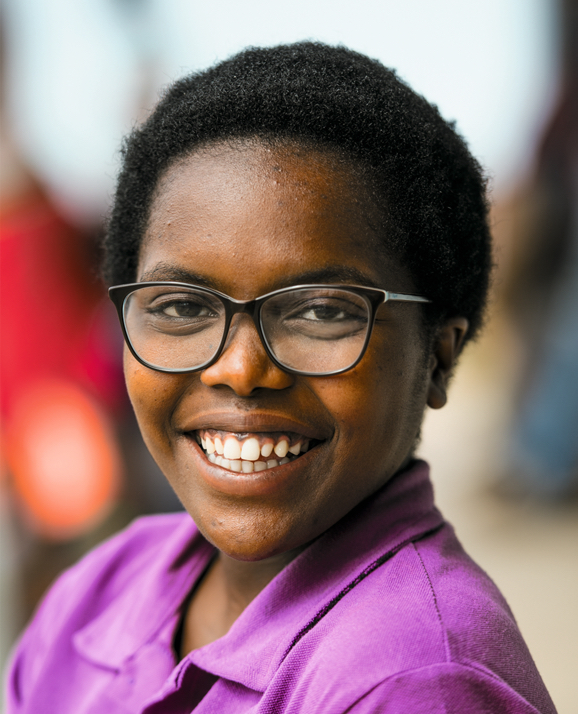
Vuvu plans to study social work at Nelson Mandela University in Port Elizabeth when she has completed her year as a ground-BREAKER.
The training currently in progress at the sports arena illustrates what this means in real life. Kids, adolescents and adults have met up for a joint fitness session in the inner courtyard. They jump up and down to music, do some shadow boxing, shout encouragement to one another. The youngest are three or four years old, the oldest are the grandmothers who brought their charges along. Medals and small prizes are distributed at the end of the session. “Looking after your health is very important,” Themba Maseti tells the children, using the microphone for maximum effect. Then the 41-year-old program manager – the face and driving force behind this center and three others – hands the mike back to the DJ. Bubbles and Oshi invite the kids to dance on the small stage, and a few of the boys perform some impressive dance moves. It’s all part of an ordinary morning in the loveLife Centre. “This isn’t a job, it’s a vocation,” Themba says. He is proud that several former groundBREAKERS now have good jobs, one has even made it as a breakfast television presenter. “That’s the very best example of what loveLife is all about.”
Energy and joie de vivre are sometimes not easy to find outside the center. Stray dogs roam the streets of KwaNobuhl, cows and pigs run free. A red and white circus tent has been erected in front of one house. Is there a celebration?
“There was a funeral yesterday,” says Vuvu, who lives nearby with her mother and brother. Their house stands high up on the slope where the tarmac road becomes a sandy path. It overlooks hills, other houses and huts, interspersed with wasteland where plastic trash blown in by the coastal winds flutters. “Nice view”, the visitor says to Vuvu’s brother. “Really?” is his skeptical response.
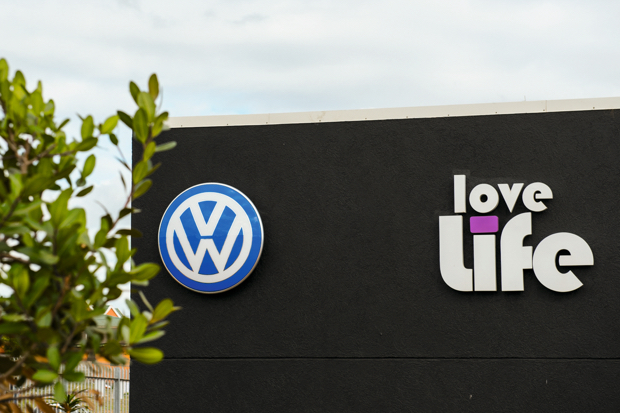
The groundBREAKERS from the township all come from very different backgrounds. Oshi, whose full name is Owethu Danster, went to a private school and is now studying at Nelson Mandela University in Port Elizabeth. That is what Babalwa Majola, known as Bubbles because of her vivacious temperament and unruly hair, also intends to do. As a groundBREAKER, she works in a clinic as a health counsellor, gaining her first valuable practical insights. “My mom has always done everything she can to help me get on in life,” Bubbles says. “And we never went to bed hungry.” The kitchen in her mother’s house is a cozy room with an enormous stove. In the next room, her brother is cutting the hair of some other kids; the annex doubles as his salon and bedroom. Every morning, Bubbles’ mother still cooks food, fills two insulated boxes, and takes her cooking to the factories in Uitenhage to sell to the workers. Bubbles has a photo on her mobile phone showing her mother setting off in the mornings with the boxes on a trolley. “I quite literally owe who I am to those boxes.” Bubbles wants to say a big thank you to her mother when she has graduated. “We’re going to have an enormous party, mom, with masses of food.”
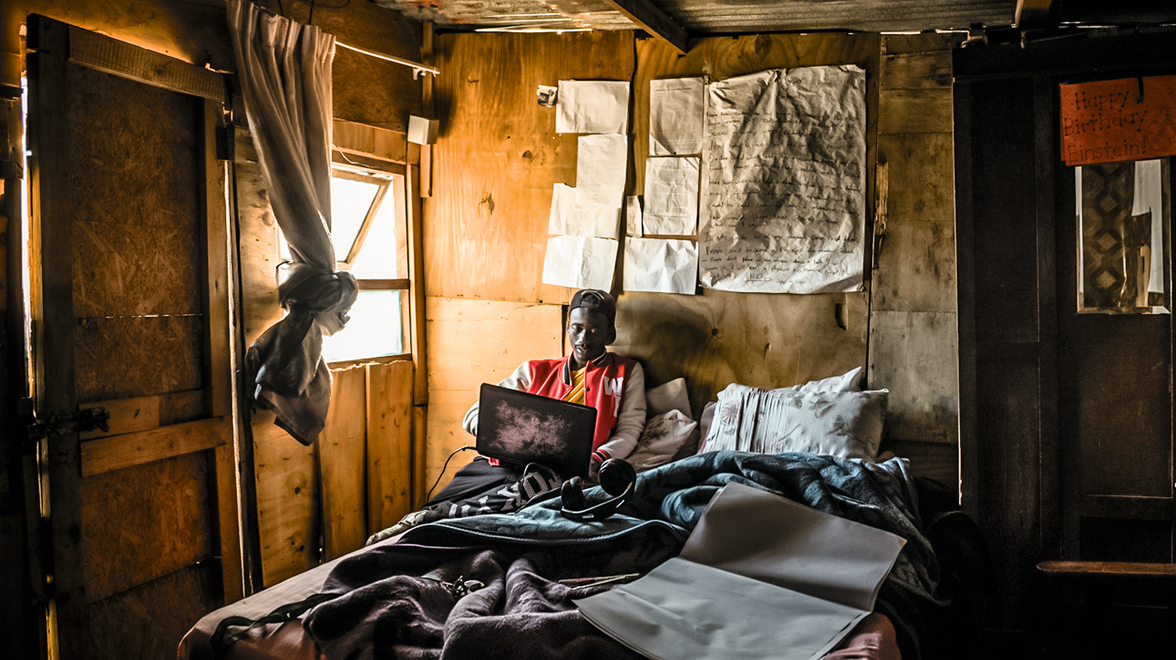
Plenty of ideas and plans for the future: Einstein in his room behind his parents’ house.
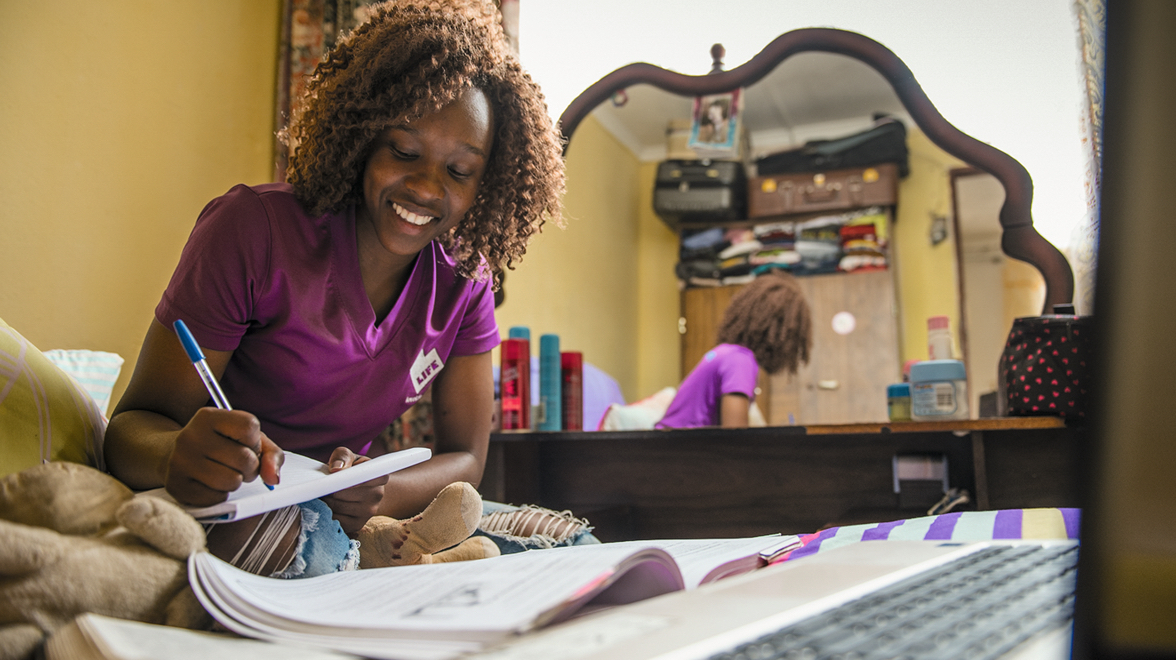
Bubbles works in a clinic and has learnt a great deal about diabetes, HIV, and pregnancy tests. She wants to begin studying soon.
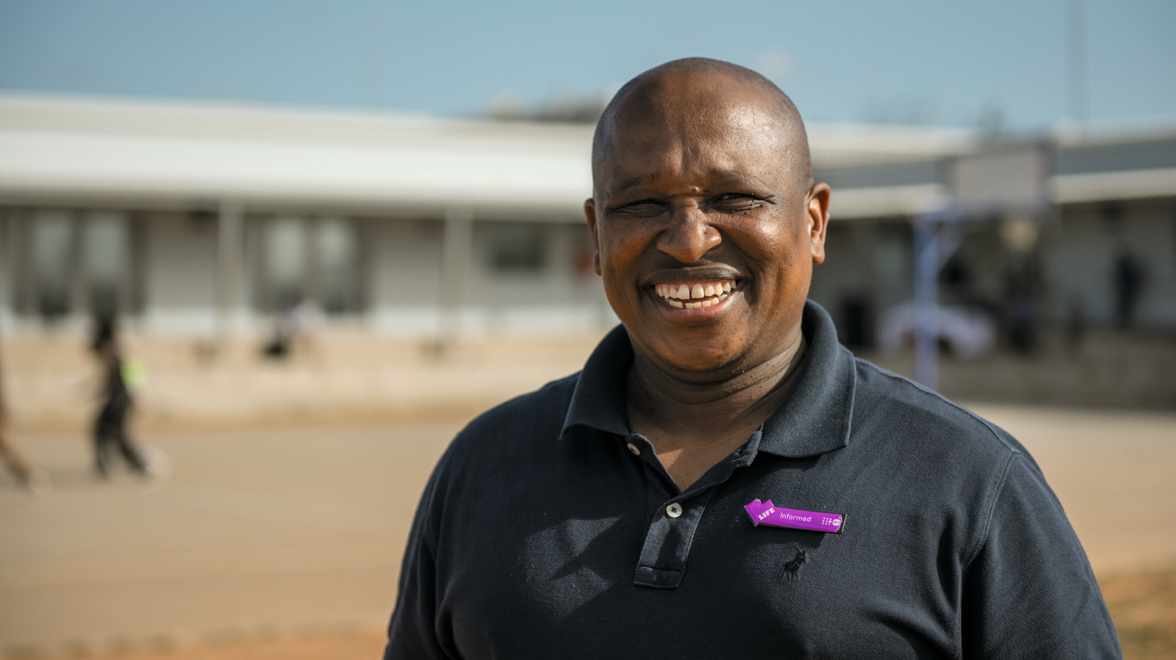
Thema Maseti (right) is responsible for a total of four loveLife Centres and is always ready to listen.
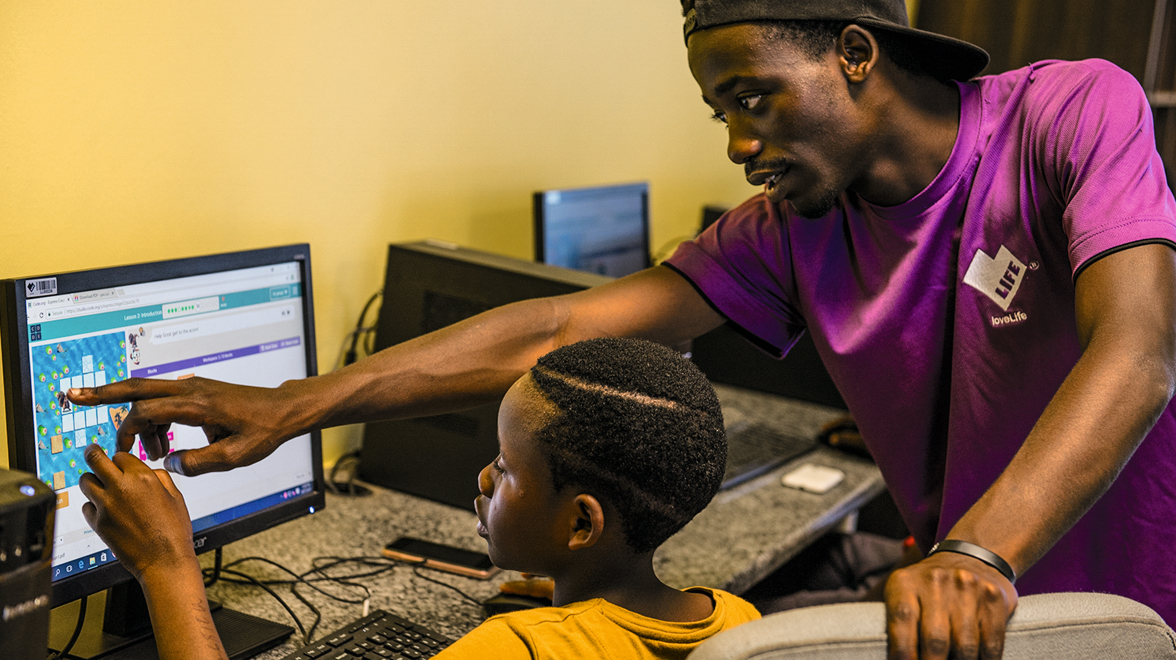
Programming with Einstein: Ayanda Sali (right) teaches children how to use a computer.
“My mom has always done everything she can to help me get on in life. We never went to bed hungry.”
Babalwa Majola alias Bubbles, groundBREAKER
The parents of groundBREAKER Ayanda Sali, 24, have also tried to give him as much support as possible. Ayanda, aka Einstein because of his love of math and IT, lives with his parents and two younger brothers on the outskirts of the township. The garden of his house is carefully looked after. Einstein’s father Amos grows pumpkins and strawberries, spinach and carrots there to feed the family. “They do great work,” his father says, referring to his son and the other groundBREAKERS.
Einstein’s room is at the back of the house, a wooden shack right next to the henhouse. Inside, there is just enough space for a bed, a television set and an ancient cassette recorder, which he uses as a speaker for the computer. The wall is covered with handwritten notes, one of which says: “The only limit is the one that exists in your mind.”
Einstein’s mind is not familiar with many limits. He has plenty of ideas – for example, he wants to write a program to create an app for a 3-D model of your body to try out new clothes or make up, which you can then order direct. “Who enjoys queuing up in a shop?” Unfortunately, his computer is on its last legs, so it is difficult for him to continue writing the code for the app. There are more limits in the real world than there are in his mind. He had a study bursary for university, but that meant getting up at three in the morning to walk to the station. And making the same journey back home every evening. Somewhere along the line he just couldn’t take it any longer.
Give up? No way! At the loveLife Centre he teaches children and adolescents how to use a computer. He also visits schools and communities to talk about how to lead a healthy and self-determined life. What drives him? “The idea that I can change the world.” With anyone else, that could sound like an empty phrase. Not with Einstein, though. He believes it. And he believes he has the strength to start something big. To be a groundBREAKER.
Volkswagen South Africa
Volkswagen South Africa’s Uitenhage plant is the oldest Volkswagen plant outside Germany. The first Beetle in South Africa was assembled there in 1951. Today, the plant has a workforce of 3,900.
The road to the KwaNobuhle township passes the plant and a large compound where thousands of vehicle are stored, waiting to be delivered. From 2018, the plant will manufacture 150,000 vehicles a year. Two models are built here: the New Volkswagen Polo and the Volkswagen Polo Viva (bestselling model in sub-Saharan Africa).
One striking feature of the urban landscape is the large number of Golf I. This model was built in South Africa up to 2009 and is very popular among car owners, including tuning fans who spray them in the colors of the rainbow and fit alloy wheels and other extras.
